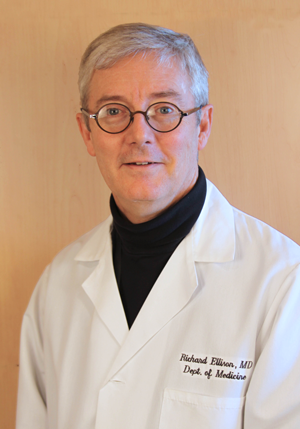The virus causing COVID-19 is changing. UMass Medical School researchers are working with a statewide network in partnership with the Broad Institute of MIT and Harvard and the U.S. Centers for Disease Control and Prevention to determine the extent of SARS-CoV-2 mutations in the Worcester area and what role they might play in community spread.

“The concern is that we don’t know right now how much this virus is going to change over time,” said infectious disease specialist Richard T. Ellison III, MD, professor of medicine, and hospital epidemiologist at UMass Memorial Medical Center.
“The only way we can do that is by checking the genomic sequence of the virus and then looking to see if the genes in the virus are changing. We’d like to also see if we can better understand how the virus is being transmitted between individuals. It is clear that when someone gets the virus, the rest of their household gets the same virus. But how does the first person get it?”
Dr. Ellison explained that SARS-CoV-2 is an RNA virus, and RNA viruses don’t do a great job of making exact genetic copies of their RNA. However, because some kinds of changes in the RNA sequence will not affect the sequence of amino acids in the proteins that make up the virus, these mutations will not necessarily change the function of the virus. He said that several mutations probably show up every few weeks in any given RNA virus.
If a virus spreads from one person to others in their household or workplace, there will likely be very few if any differences in the RNA sequence because there has not been time to develop mutations, he said. But if two individuals got the virus from contact with different individuals—say, one from a roommate and one while traveling to another state—there are likely to be differences in the genetic sequences of the viruses that infected them.
This explains why genomic sequencing of SARS-CoV-2 can be a useful tool for contact tracing and community epidemiology. Ellison said researchers are working with state and local health officials to identify the virus’s mutations through the community, leading, they hope, to targeted approaches to better stop the spread.
This work will allow for tracking of the introduction of new variants of SARS-CoV-2, such as the new and apparently more contagious variants that have been found in the United Kingdom and South Africa.
At the beginning of January UMMS researchers started collecting virus samples to sequence from virus specimens initially collected for COVID testing.
Working with Doyle V. Ward, PhD, associate professor of microbiology & physiological systems, they are analyzing genetic sequences of samples from COVID tests done on patients who are not hospitalized, as well as comparing virus samples between patients in the hospital and the health care workers who care for them.
“We want to understand how, if a doctor or nurse gets it, what’s the mechanism? Are they coming into the hospital with it? How good are we doing in terms of protecting each other?” Ellison said.
Related stories on UMassMed News:
UMass Medical School researchers to start trial of Moderna COVID-19 vaccine in teens
A healthy microbiome builds a strong immune system that could help defeat COVID
UMass Medical School students ready to serve on COVID-19 vaccination front lines